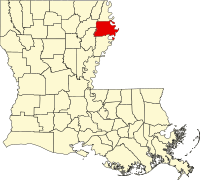Madison Parish
| Madison Parish, Louisiana | |
|---|---|

Madison Parish Courthouse in Tallulah
|
|
 Location in the U.S. state of Louisiana |
|
 Louisiana's location in the U.S. |
|
| Founded | 1838 |
| Named for | James Madison |
| Seat | Tallulah |
| Largest city | Tallulah |
| Area | |
| • Total | 651 sq mi (1,686 km2) |
| • Land | 624 sq mi (1,616 km2) |
| • Water | 26 sq mi (67 km2), 4.1% |
| Population (est.) | |
| • (2015) | 11,514 |
| • Density | 18.57/sq mi (7/km²) |
| Congressional district | 5th |
| Time zone | Central: UTC-6/-5 |
| Website | madisonparish |
Madison Parish (French: Paroisse de Madison) is a parish located in the U.S. state of Louisiana. As of the 2010 census, the population was 12,093. Its parish seat is Tallulah. The parish was formed in 1839.
Madison Parish was the home to many succeeding Native American groups in the thousands of years before European settlements began. Peoples of the Marksville culture, Troyville culture, Coles Creek culture and Plaquemine culture built villages and mound sites throughout the area. Notable examples include the Fitzhugh Mounds and the Raffman Site.
The parish is named for former U.S. President James Madison. Furthermore in Madison's honor, the parish courthouse is built in the colonial Virginia style of architecture though, as with many other Louisiana communities, the structure sits in the center of the immediate downtown area. It faces east. Nearby is the Tallulah City Hall, which faces south.
During the American Civil War, Madison Parish, then a rich cotton area, sent many of its men into battle early in the war. In 1862, it paid $80 to anyone joining one of her Confederate military companies. When Governor Thomas Overton Moore saw that New Orleans would fall to the Union, he issued orders for the destruction of cotton to keep it from Federal hands. Hence hundreds of thousands of dollars worth of cotton were burned as the planters sadly looked on. Governor Moore asked Brig. Gen. R. B. Todd, who commanded the Eleventh Brigade in northeast Louisiana to call into active service his own militia and all men between eighteen and forty who were not subject to conscription. These men from Madison, Carroll, and Tensas parishes were to cooperate with Confederate authorities to help repel Federal attacks in the area.
...
Wikipedia
